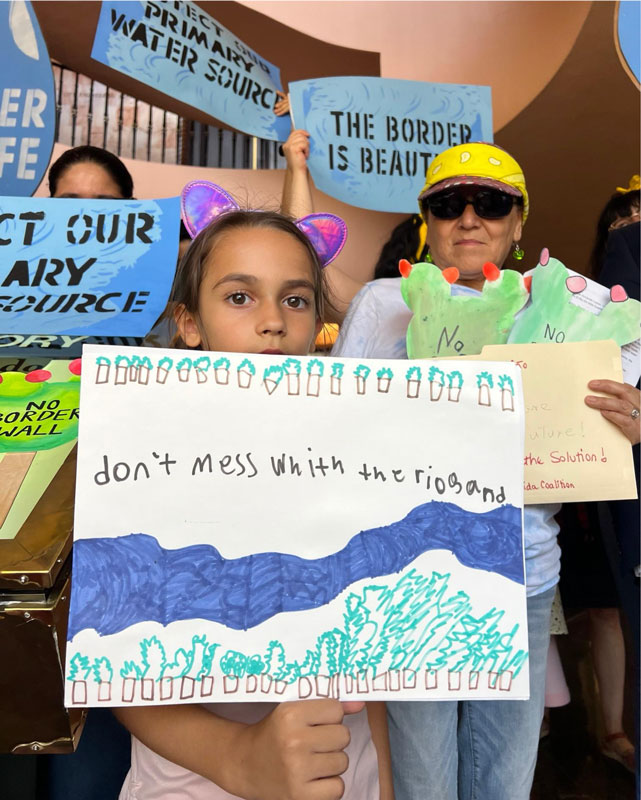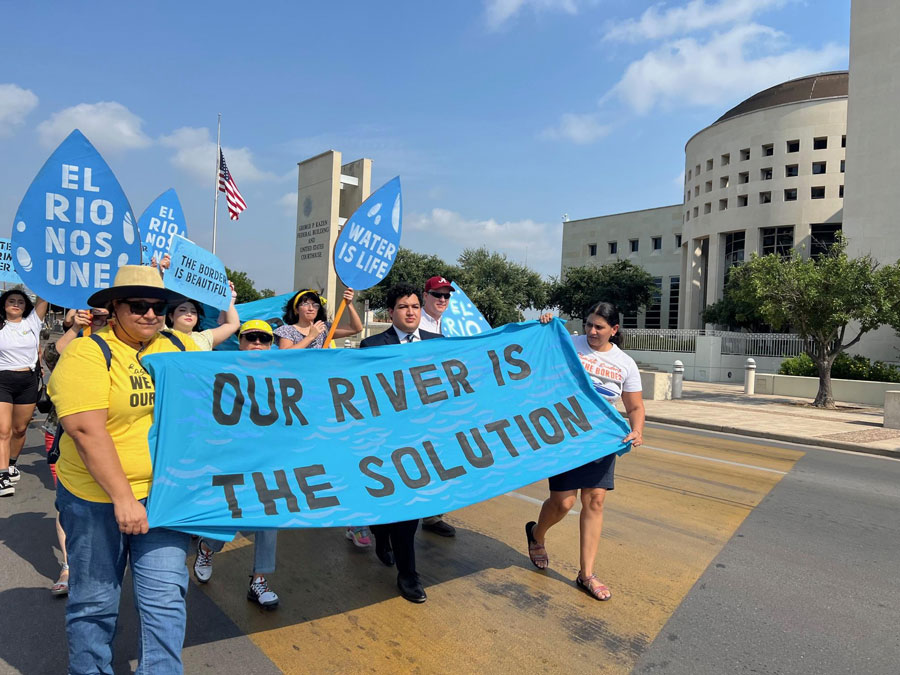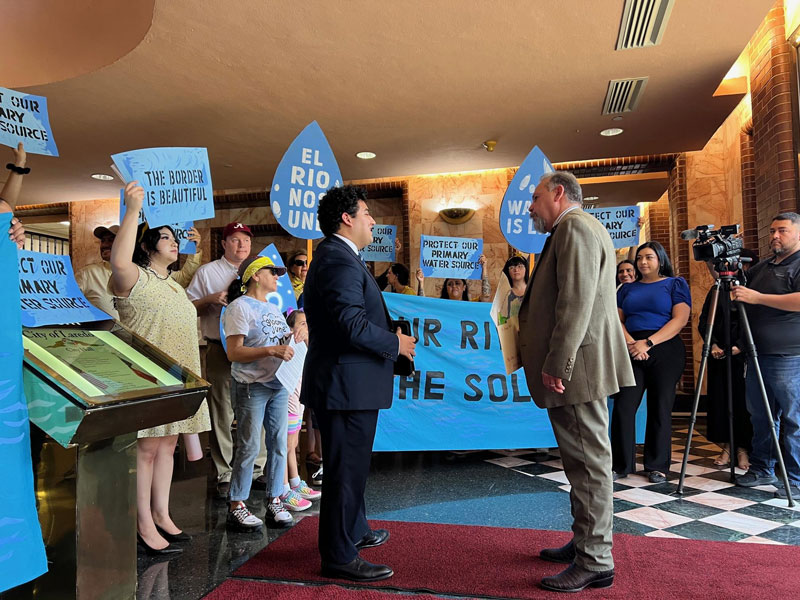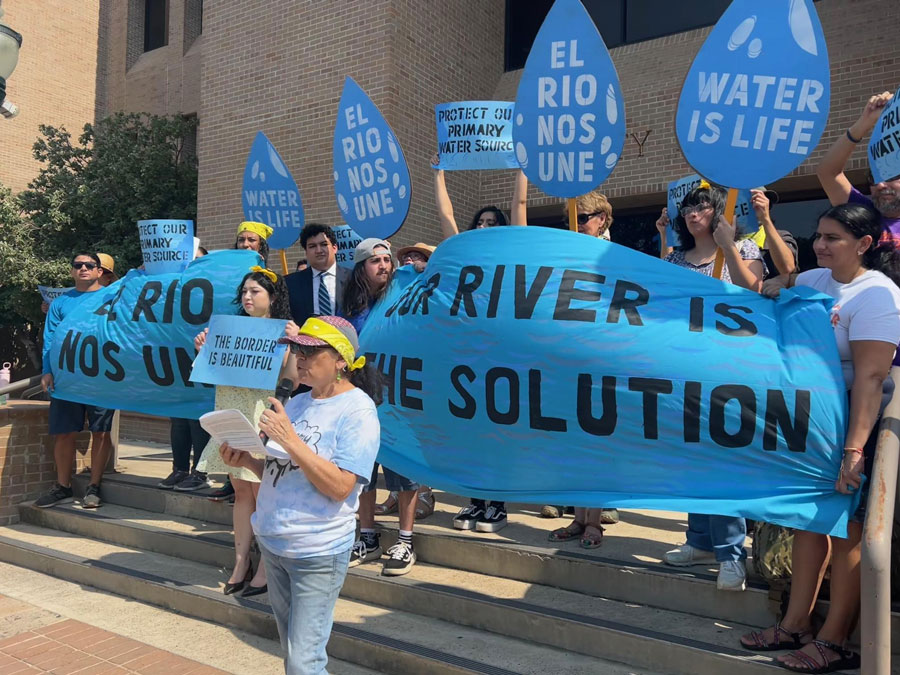Network of experts, community organizations, and local residents deliver a letter and Harvard report to Mayor in advance of City Council Special Session
Laredo-based organizations, community members, and advocates working on water issues announced its formation of El Rio Es Vida Coalition – to help guide the process of finding solutions to Laredo’s water crisis, due to declining levels in Amistad reservoir.
The Coalition spoke at City Hall as it delivered a letter and research to the Mayor’s office, in advance of a special session called for Wednesday at noon.
The growing group consists of several organizations who for decades have worked on water issues, including the Zacate Creek Green District, Sisters of Mercy, Laredo Center for Urban Agriculture & Sustainability, Monte Mucho Audubon Society, No Border Wall Coalition, Zacate Creek Creatives Coalition, Eagle Pass Border Coalition, Carrizo Comecrudo Tribe of Texas, Laredo Climate Cohort, and the Rio Grande International Study Center.

At the gathering, the coalition met with the Assisstant City Manager Steve Landin and delivered a series of recommendations for the Mayor, and two reports: the most recent Harvard University assessment on Laredo’s water supply that concluded that a “comprehensive water management approach” to the Río Grande would reduce dependency on the need for secondary sources and increase the City’s ability to rely on the Río Grande for years to come. The Harvard group was in Laredo in February and met with the Mayor at that time.
As privately owned, secondary water sources are being considered by the City, the group delivered a report by Food and Water Watch, one of the most respected research organizations focusing on municipal water supplies in the US.
The report evidenced that switching from public water sources to private water sources could raise water costs to residents by an average of 59%.
While public ownership remains the most affordable option to the residents of Laredo, the city is currently investigating secondary sources that are privately owned and costly.
Statements by participants who brought the issue before the City:
“Cuando se piensa en un futuro en el que Laredo tenga acceso a agua limpia y accesible, que no haya duda: el Río Grande es la solución. Debemos centrarnos en nuestra principal fuente de agua.” Mariana Salinas, President of the Zacate Creek Green District Coalition
“We need to prioritize our primary water source – which is the Rio Grande. The most affordable, most available solution that we need is right in front of us. Our river is the solution. We urge City Leadership to keep the focus on our primary water source, our river, which has been the source of Laredo’s water for 269 years.” Oscar A. Lopez III, Former Bill Archer Fellow at the White House where he worked on Environmental Justice and Climate Resilience
“Our tribe are the original inhabitants of these riverlands. The Rio Grande is part of our origin story. We believe that our ancestors are part of the rivers water itself. We must treat the water with respect just as we do our ancestors.” Juan Mancias, Tribal Chairman of The Carrizo/Comecrudo Tribe of Texas
“Our goal is to protect the Rio Grande as our primary source for generations to come. We need a Primary Source Advisory Committee that includes experts and community-based organizations that have been working on water issues for years, as well as local residents who would be directly impacted.” Cecy Jimenez, Youth and Climate Advocate for Laredo
“Our mayor said that he wants solutions to be supported by the will of the people, and that’s what we expect and want as well. Closed door meetings aren’t the way to go. There must be real representation on any new committees or bodies formed. We trust that the mayor will do the right thing and create a genuinely inclusive and transparent process.” Sister Rosemary Welsh, Sisters of Mercy
“Whoever controls the source, controls our future. True water security means that our water sources need to remain in public hands.” Marisol Vazquez, USDA Science Influencers Cohort Member, TAMIU biology major







Austin has secondary and privately owned utility services and they stink. Don’t do it, homies!